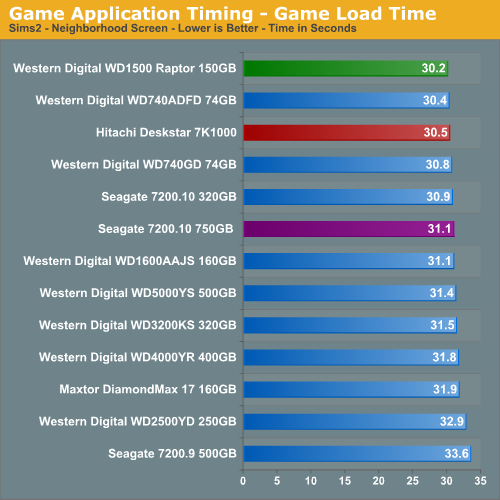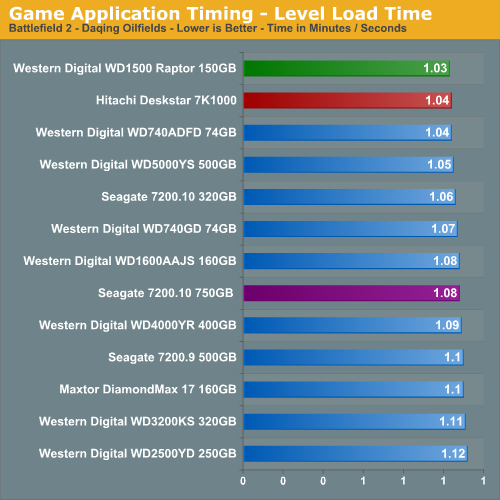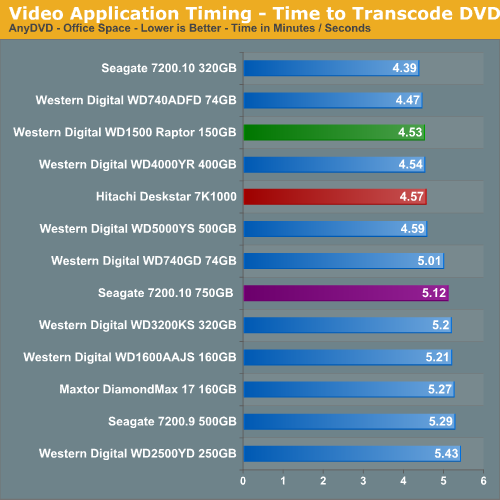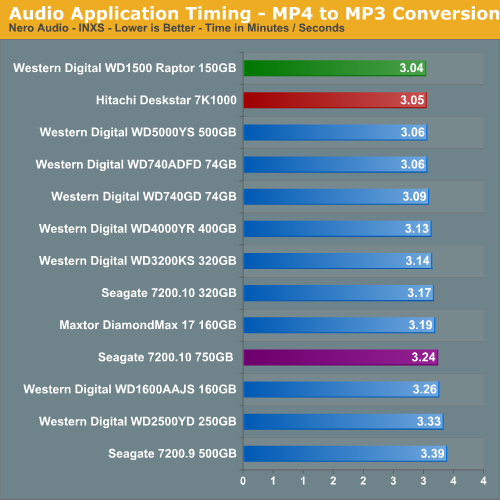Hitachi Deskstar 7K1000: Terabyte Storage arrives on the Desktop
by Gary Key on March 19, 2007 8:00 AM EST- Posted in
- Storage
Actual Application Performance
Our application benchmarks are designed to show application performance results with times being reported in minutes / seconds or seconds only, with lower scores being better. Our graph engine does not allow for a time format such a 1:05 (one minute, five seconds) so this time value will be represented as 1.05. While these tests will show some differences between the drives it is important to understand we are no longer measuring the pure performance of the hard drive but how well our platform performs with each individual drive. The performance of a hard drive is an integral part of the computer platform but other factors such as memory, CPU, core logic, and even driver choice can play a major role in determining how well the hard drive performs in any given task. Also worth noting is that new features of Windows Vista - specifically SuperFetch - can further reduce the measured performance differences between hard drives.
Game Load Test
Our Sims 2 - Open for Business test measures the time it takes to load the initial portion of the game. Our application timer starts when the game icon is initiated until the neighborhood menu appears.

The results are basically the same as our IPEAK results as the WD Raptor series continues to lead all drives although the performance differences are not as drastic once we take into account the entire platform. We notice the Hitachi drive scoring better than the other 7200rpm drives and the drive seemed just as fast as the Raptors over the course of game play, something we generally did not find with our other top performing 7200rpm drives.
Game Level Load
This test centers on the actual loading of a playable level within our game selections. We run Battlefield 2 and measure the time it takes to load the Daqing Oilfields level. Our application timer begins when the start single player icon is initiated and ends when the join game icon is visible.

The WD1500ADFD Raptor continues its pattern of being the best available drive for the gaming enthusiast and our subjective opinion also matches the test scores although we are openly debating this statement now. Of course it is easy to debate our continued love affair with the Raptor as the difference in load times between the WD1500 and the 7K1000 drive was only one second so it appears we are getting close to finally having a Raptor killer in the large capacity 7200rpm drives. We firmly believe the areal density and 32 MB cache advantages of the Hitachi 7K1000 make up for the rotational and random access advantages of the Raptor in our gaming tests.
AnyDVD 5.9.6
Our next test has us utilizing the "ripping" function of AnyDVD to copy the Office Space DVD file from our source drive to our test drive. Our DVD features 29 files totaling 7.55GB of data and is an excellent test for determining the write speed of a drive.

Our Seagate Barracuda 7200.10 320GB drive scores extremely well in this test due to exceptional read times with large data blocks in sequential order, something its larger sibling does not handle well. This is one of the few tests where our 7K1000 does not finish ahead of the other 7200rpm drives but it does improve upon its performance when compared to the IPEAK results. The 7K1000 still manages a top five finish while finishing 15 seconds ahead of the Seagate 750GB drive.
Nero Audio Encode
Our last test has us utilizing the audio encoding functions of Nero to convert our INXS Greatest Hits audio files in MP4 format to a high quality variable rate MP3 file for our portable player. Our test features 16 files totaling 137MB of data and is an excellent test for determining the read and write speed of a drive.

The test results show once again the amount of time a fast hard drive like the WD Raptor can save over the course of audio or video file manipulation session. In this case, the WD1500ADFD finishes just ahead of the 7K1000 where it handles small block sizes in sequential order slightly better due to is rotational speed advantage.
Our application benchmarks are designed to show application performance results with times being reported in minutes / seconds or seconds only, with lower scores being better. Our graph engine does not allow for a time format such a 1:05 (one minute, five seconds) so this time value will be represented as 1.05. While these tests will show some differences between the drives it is important to understand we are no longer measuring the pure performance of the hard drive but how well our platform performs with each individual drive. The performance of a hard drive is an integral part of the computer platform but other factors such as memory, CPU, core logic, and even driver choice can play a major role in determining how well the hard drive performs in any given task. Also worth noting is that new features of Windows Vista - specifically SuperFetch - can further reduce the measured performance differences between hard drives.
Game Load Test
Our Sims 2 - Open for Business test measures the time it takes to load the initial portion of the game. Our application timer starts when the game icon is initiated until the neighborhood menu appears.

The results are basically the same as our IPEAK results as the WD Raptor series continues to lead all drives although the performance differences are not as drastic once we take into account the entire platform. We notice the Hitachi drive scoring better than the other 7200rpm drives and the drive seemed just as fast as the Raptors over the course of game play, something we generally did not find with our other top performing 7200rpm drives.
Game Level Load
This test centers on the actual loading of a playable level within our game selections. We run Battlefield 2 and measure the time it takes to load the Daqing Oilfields level. Our application timer begins when the start single player icon is initiated and ends when the join game icon is visible.

The WD1500ADFD Raptor continues its pattern of being the best available drive for the gaming enthusiast and our subjective opinion also matches the test scores although we are openly debating this statement now. Of course it is easy to debate our continued love affair with the Raptor as the difference in load times between the WD1500 and the 7K1000 drive was only one second so it appears we are getting close to finally having a Raptor killer in the large capacity 7200rpm drives. We firmly believe the areal density and 32 MB cache advantages of the Hitachi 7K1000 make up for the rotational and random access advantages of the Raptor in our gaming tests.
AnyDVD 5.9.6
Our next test has us utilizing the "ripping" function of AnyDVD to copy the Office Space DVD file from our source drive to our test drive. Our DVD features 29 files totaling 7.55GB of data and is an excellent test for determining the write speed of a drive.

Our Seagate Barracuda 7200.10 320GB drive scores extremely well in this test due to exceptional read times with large data blocks in sequential order, something its larger sibling does not handle well. This is one of the few tests where our 7K1000 does not finish ahead of the other 7200rpm drives but it does improve upon its performance when compared to the IPEAK results. The 7K1000 still manages a top five finish while finishing 15 seconds ahead of the Seagate 750GB drive.
Nero Audio Encode
Our last test has us utilizing the audio encoding functions of Nero to convert our INXS Greatest Hits audio files in MP4 format to a high quality variable rate MP3 file for our portable player. Our test features 16 files totaling 137MB of data and is an excellent test for determining the read and write speed of a drive.

The test results show once again the amount of time a fast hard drive like the WD Raptor can save over the course of audio or video file manipulation session. In this case, the WD1500ADFD finishes just ahead of the 7K1000 where it handles small block sizes in sequential order slightly better due to is rotational speed advantage.










74 Comments
View All Comments
mikeg - Thursday, April 26, 2007 - link
Its been a over a month since the article came out and I still don't see any in the retail stores or a non OEM drive. Where can I get one?? Anyone see a retail box of these drives a a retailer? I want to get a coupleMike
jojo4u - Monday, March 26, 2007 - link
Hello Gary,the Hitachi datasheet refers to three idle modes using APM. The results with AAM enabled could suggest that APM is automatically engaged with AAM. So perhaups one should check the APM level with Hitachi's Feature Tool or the generic tools http://hdparm-win32.dyndns.org/hdparm/">hdparm or hddscan.
Gary Key - Friday, March 30, 2007 - link
We had a lengthy meeting with the Hitachi engineers this week to go over APM and AAM modes along with the firmware that is shipping on the Dell drives. I hope to have some answers next week as testing APM capabilities on a Dell based system resulted in a slightly different behavior than our test bench. I have completed the balance of testing with various AAM/NCQ on/off combinations and some additional benchmark tests. I am hoping to update the article next week. Also, I ran acoustic tests in a different manner and will have those results available. Until, then I did find out that sitting a drive on a foam brick outside of a system and taking measurements from the top will mask some of the drives acoustic results. The majority of noise emitted from this drive comes from the bottom, not the top. ;)ddarko - Monday, March 26, 2007 - link
"However, Hitachi has informed us they have the capability to go to 250GB per-platter designs but launched at smaller capacities to ensure their reliability rate targets were met. Considering the absolute importance of data integrity we think this was a wise move."This sounds like an sneaky attempt by Hitachi to raise doubt about the safety of Seagate's forthcoming 1TB drive. Where is the data to support this rather bold statement that 250GB platters designs are not as capable as 200GB designs of meeting these completely unspecified "reliability rate targets"? What does that even mean? Can we infer that 150GB platter designs are even more reliable than 200GB designs? It's disappointing to see the review accept Hitachi's statement without question, going so far as to even applaud Hitachi for its approach without any evidence whatsoever to back it.
Lord Evermore - Thursday, March 22, 2007 - link
While I know memory density in general isn't increasing nearly as fast as hard drive size, 32MB cache seems pretty chintzy for a top-end product. I suppose 16MB on the 750GB drives is even worse.My first 528MB hard drive with a 512KB cache was a 1/1007 ratio (using binary cache size, and labelled drive size which would be around binary 512MB). Other drives still had as little as 128KB cache, so they could have been as little as a 1/4028 ratio, but better with smaller drives. I think anything larger than 512MB always had 512KB.
A 20GB drive with 2MB cache is 1/9536 ratio.
A 100GB drive with 2MB cache is 1/47683.
Then the jump to 8MB cache makes the ratio much better at 1/11920 for a 100GB drive (I'm ignoring the lower-cost models that had higher capacities, but still 2MB cache). Then it gets progressively worse as you get up to the 500GB size drives. Then we make another cache size jump, and the 160GB to 500GB models have a 16MB option, which is back to 1/9536 on a 160GB, to 1/29802 on a 500GB.
The trend here being that we stick with a particular cache size as drive size increases so the ratio gets worse and worse, then we make a cache size jump which improves the ratio and it gets worse again, then we make another cache size jump again.
Now we go to 750GB drives with 16MB cache. Now we are up to a 1/44703 ratio, only the 2nd worse ever, seems like time for another cache increase. Jumping to 32MB with a 100TB drive only makes it 1/29802. Not a very significant change despite doubling the cache again, since the drive size also increased, and it'll only get worse as they increase the drive size. Even 32MB on a 750GB drive is 1/22351, only slightly better than the 16MB/500GB flagship drives when they came out, and we don't even HAVE a 32MB/750GB drive.
A 512MB cache would be nice. That's still not the best ratio ever, it's still 1/1862, but that's a heck of a lot better than 1/30,000th. At the very least, they need to jump those cache chip densities a lot, or use more than one. Even a single 512MB density chip would be 64MB, still not great but better.
Per Hansson - Sunday, March 25, 2007 - link
Bigger caches would almost make it a necessity that you run the system on a UPS.Loosing 32mb of data that is yet to be written to the platters is allot, but 512mb?
And the UPS would not take into account OS crashes...
I'm not sure how much this would affect performance either, but a review of a SCSI drive with a SCSI controller with 2mb - 1gb of cache would answer that question well...
yehuda - Wednesday, March 21, 2007 - link
Do they plan to launch a single platter variant sometime in the near future?Gary Key - Wednesday, March 21, 2007 - link
They will be releasing a 750GB variant in May. Our initial reports have the single platter drives along with the 300~500GB models coming later in the summer. I am trying to get that confirmed now.DeathSniper - Tuesday, March 20, 2007 - link
Last page..."The Achilles heal of the Seagate 750GB drive..."I think it should be heel, not heal ;)
Spacecomber - Tuesday, March 20, 2007 - link
While this drive has enough in the way of other features to make it stand out from the crowd, I was a bit surprised to see that Hitachi hadn't upped the warranty to 5 years for this drive, which is what Seagate offers on most of their drives and WD offers on their raptors.